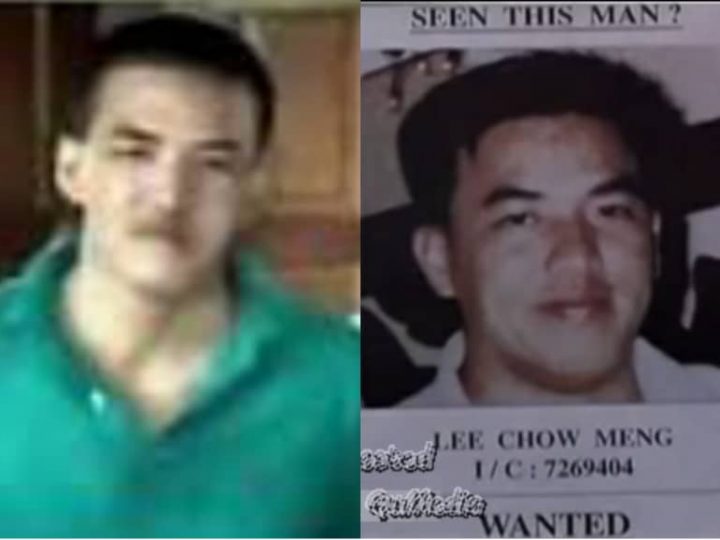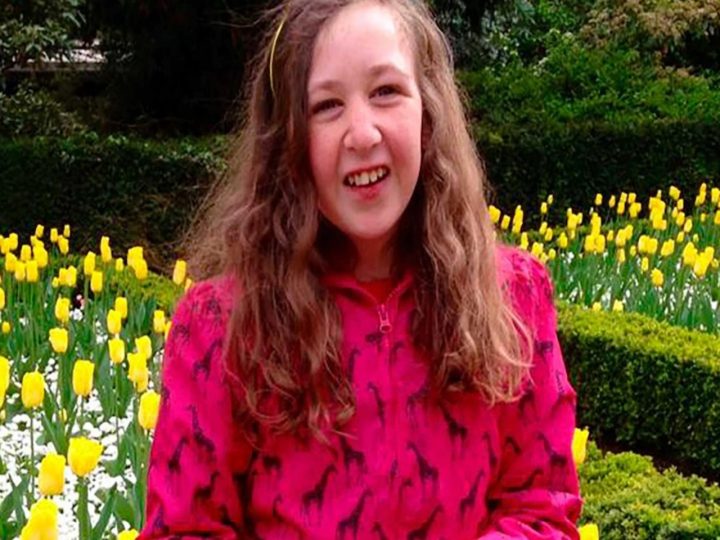Decoding Gang 08: The Sinister Story Of Bentong Kali’s Ongoing Criminal Domination
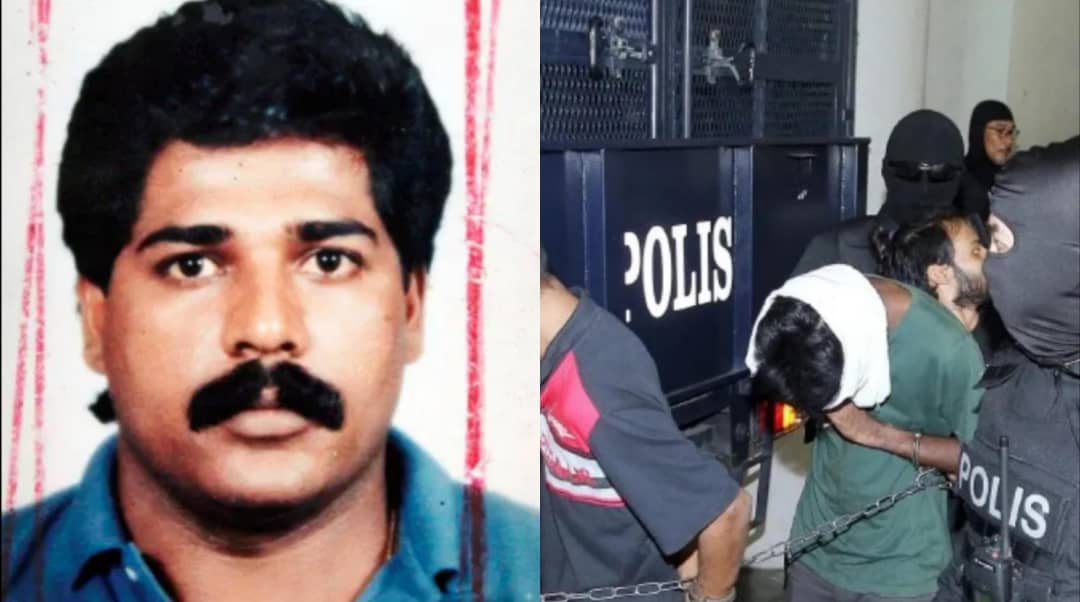 Thirsty for JUICE content? Quench your cravings on our Instagram, TikTok and WhatsApp
Thirsty for JUICE content? Quench your cravings on our Instagram, TikTok and WhatsApp
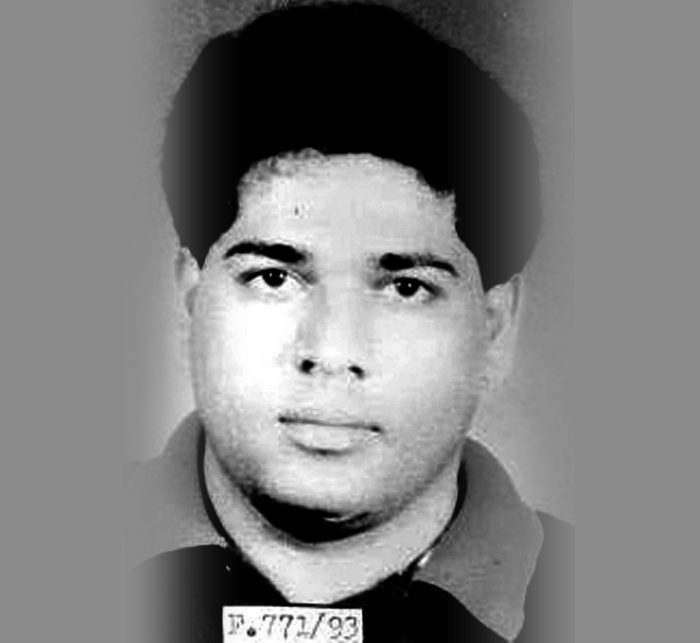
In the shadowy corners of Malaysia, where darkness and desperation intertwine, there exists a tale that sends shivers down the spines of even the bravest of men. It is a true story of a criminal empire so ruthless, so cunning, that its name alone invokes fear in the hearts of those who dare to utter it. These are the chilling chronicles of Gang 08 – a saga of blood-soaked streets, shattered dreams, and the relentless pursuit of power.
Disclaimer: The following article contains mentions of sensitive and potentially distressing subjects, including murder, violence, drugs, and gangsterism. Reader discretion is advised. The purpose of this article is to provide information and raise awareness about these topics in a responsible manner. The content presented does not endorse or promote any illegal or harmful activities.
Imagine a time when the very mention of their name would send communities into a frenzy of panic, mothers clutching their children tightly, and fathers whispering prayers for protection. Gang 08, led by the infamous Bentong Kali, ruled with an iron fist, leaving behind a trail of devastation that stained the nation’s history.
Kalimuthu s/o Pakirisamy, better known as Bentong Kali (pictured above), was not just an ordinary criminal; he was a Malaysian-Tamil gangster whose name struck fear into the hearts of many during the 1990s. His criminal reign was marked by a trail of bloodshed and terror that left an indelible mark on the nation – an unforgiving legacy that continues to live on years after his death.
A Bloodstained Legacy
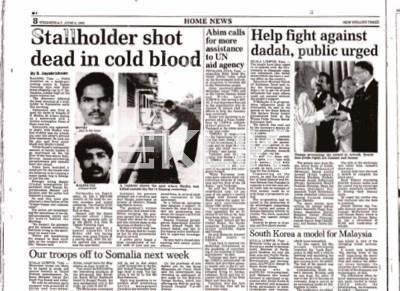
Between 1990 and 1993, Bentong Kali orchestrated a series of 17 brutal gangland-style executions, some of which tragically claimed innocent lives. The shocking nature of his crimes garnered national attention, cementing his status as a ruthless and vengeful criminal.
His brutal nature first came to light was on January 24th, 1993, when tragedy struck the Tai Kah Seng Restaurant on Old Klang Road. An armed assailant entered and fatally shot V Letchumanan, while two others sustained severe injuries.
The perpetrator, later identified as an individual known as Kali, Bentong Kali, or Sam, became the prime suspect in the case. Two weeks later, another distressing incident occurred when M Athinathan, an unemployed man, was gunned down near his residence on Jalan Klang Lama.
It was revealed that M Athinathan had previously faced detention in Pulau Jerejak in 1986, accused of involvement in an armed robbery. Interestingly, Kalimuthu, who served a two-year detention in the same facility in 1986, was closely associated with M Athinathan. Kalimuthu’s loyal lieutenant, Gunalan, also known as Billiard, an ex-convict in his early 20s, often accompanied him.
The next heinous act committed by Kalimuthu and his gang took place in Kuala Garing, Rawang. Armed with machetes, knives, and iron rods, Kalimuthu and his accomplices launched a brutal assault on a restaurant, indiscriminately attacking patrons.
Their victims in this attack were Chanca Singh, aged 46, and Tee Heh Wah, aged 48, who tragically lost their lives. Witnesses and acquaintances of Kalimuthu described him as rage-filled, relentlessly pursuing former gang members who had betrayed him. He also exhibited a tendency to threaten ordinary individuals randomly.
During police briefings, it was revealed that Kalimuthu habitually carried multiple weapons and showed no hesitation in resorting to gun violence. In one incident on Jalan Raja Laut, Kalimuthu and Gunalan set out to confront their fiercest rival, Mohanan Pillai. However, their misguided mission resulted in the fatal shooting of two innocent victims, S Balarajah and Balwant Singh, who were simply having dinner at a restaurant.
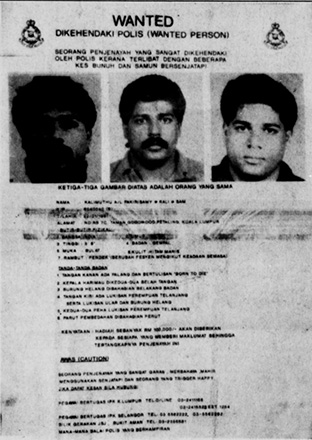
By mid-1993, Kalimuthu had become a highly sought-after fugitive, with both the Kuala Lumpur and Selangor police offering a reward of RM 100,000 for information leading to his arrest. In an attempt to evade capture, Kalimuthu went into hiding, constantly changing locations and exercising extreme caution.
Eventually, he settled in Flat Taming Jaya, Balakong, where he continued engaging in drug trafficking activities. However, a dispute with a group of men proved to be his downfall. Following an altercation in which Kalimuthu shot K Muthu, aged 24, in the face at close range for confronting him about public urination, the police raided his flat. Although they discovered a drug processing lab, Kalimuthu managed to escape, leaving behind his passport.
The passport photo left behind became crucial in identifying and confirming Kalimuthu’s altered appearance. Suganthi Suparmaniam, the author of the book “The Story of Bentong Kali: Crime and Society in 90s Kuala Lumpur,” conducted extensive interviews with Kalimuthu’s former associates, piecing together a timeline of his movements after the Taming Jaya shooting incident.
Suganthi revealed that Kalimuthu was driven by bitterness and agitation after losing his drug laboratory in the Taming Jaya flat. Fueled by anger, he returned to the flats a few weeks later with the intention of seeking revenge on K. Muthu’s friends.
Accompanied by Gunalan, Kalimuthu made an uninvited appearance at a birthday party in Flat Taming Jaya, where they unleashed a hail of gunfire upon the unsuspecting crowd, resulting in the deaths of four individuals and injuries to two others.
From Troubled Youth to Criminal Mastermind
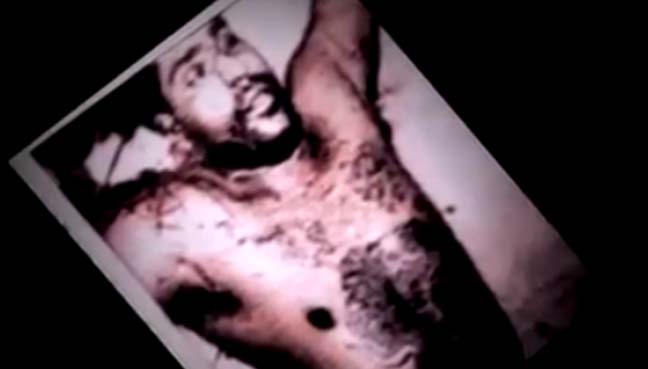
Bentong Kali’s early life was marked by dropping out of school in Form 1 and engaging in a criminal lifestyle from a young age. He adorned his body with various tattoos, including a ‘BORN TO DIE’ tattoo on his right hand and a tiger head tattoo on his left hand. He also had tattoos of naked women on his thighs, along with snake and eagle characters on his back. Notably, he had a surgical scar on his abdomen. His weapon of choice was a German-made semi-automatic pistol, the SIG Sauer P226.
His criminal career actually began during his childhood, leading to his first arrest at the age of 14. He served time in prison until his release at the age of 19. Later, he joined a Chinese triad known as ‘Gang 04’ in his hometown of Bentong. However, he faced another arrest in July 1985 under the Emergency Ordinance and was incarcerated on Jerejak Island, Penang. Despite this, he was released in 1987 and placed under limited residence restrictions in Kuantan, Pahang.
Unfazed by his past, Bentong Kali returned to the criminal world, establishing his own triad called ‘Gang 08’ in Jalan Klang Lama, Kuala Lumpur, and later in Taman Sentosa, Klang. His involvement in racketeering activities led to his house arrest, but he eventually formed ‘Gang 36 Jalan Klang Lama’ in Kuala Lumpur.
Drug trafficking was a prevalent activity within the ‘Gang 04’ groups, and Bentong Kali faced arrest once again in April 1980 under the Dangerous Drugs Act 1952. However, insufficient evidence resulted in his release. He was subsequently placed under house arrest in Gopeng, Perak, for two years. In November 1984, Bentong Kali disappeared, leaving behind a trail of criminal activities and uncertainty among the public.
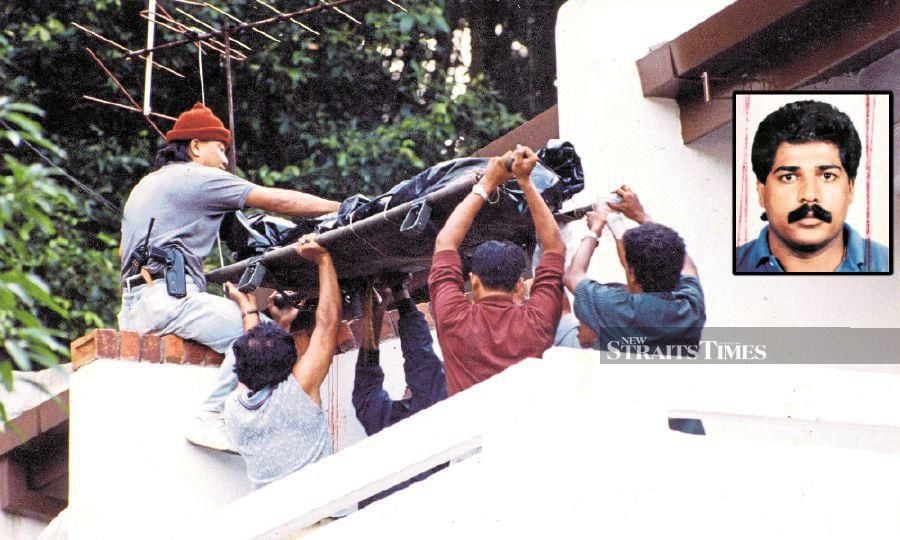
Despite his elusive nature, the relentless efforts of the police finally led them to Bentong Kali’s hideout in a double-storey terraced house in Medan Damansara, Kuala Lumpur , on June 29, 1993. In the early hours of the morning, a highly trained team of police officers from the Special Actions Unit in Bukit Aman surrounded the house, preparing for the encounter. As expected, a fierce firefight ensued between Bentong Kali and his accomplices against the officers. Tragically, during the intense exchange of gunfire, Bentong Kali was struck in the head and succumbed to his injuries. His accomplices also met the same fate in the battle.
On July 2, 1993, three days after his demise, Bentong Kali’s remains were laid to rest. The solemn funeral rites were carried out by his son.
The Terror That Persists
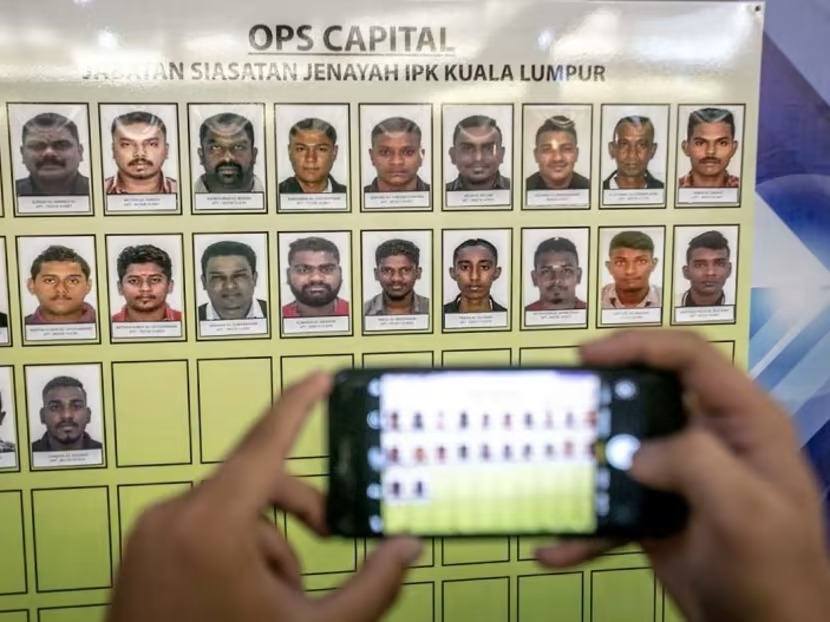
Even so, the legacy of Bentong Kali and his gang, Gang 08, lingers on to this very day. Numerous reports of violent crimes attributed to its members continue to plague Malaysia.
In 2019, significant actions were taken against the gang, resulting in the detention of its “Datuk Seri”. Local police subsequently described the gang members as “running around like a headless chicken”, with a surge in internal disputes and threats against the public.
The detention was the aftermath of a meticulously planned operation, whereby the Malaysian police apprehended a total of 19 alleged members of the notorious Gang 08 organised crime group. Acting swiftly on public tip-offs and equipped with valuable intelligence, the police launched a targeted operation to combat extortion activities conducted by the gang.
Specifically, in a case involving a poultry farm owner in Teluk Panglima Garang, Kuala Langat, Selangor, the Selangor police’s Criminal Investigation Department (CID) established a dedicated hotline for the public to report such incidents. Upon receiving information about a group of men demanding “protection money,” the CID swiftly mobilised a team of detectives from the serious crimes division to tackle the case.
Operating under the anti-secret societies operation known as Ops Cantas Khas, the CID detectives efficiently traced and apprehended seven suspects, aged between 18 and 30, within a mere two hours. These individuals were identified as members of the Ministry-banned Gang 08, a notorious criminal organisation that had been linked to various cases of extortion and robberies at construction sites in Petaling Jaya, Serdang, and Sepang.
According to SAC Fadzil Ahmat, the Selangor police CID chief, investigations revealed that Gang 08 targeted construction sites to extort protection money from landowners or site managers. Refusal to comply often led to gang members resorting to robberies at the sites, using coercion to compel victims into availing the gang’s so-called “security services” and paying protection fees.
Additionally, in September 2019, Selangor police confirmed the identities of the individuals involved in a tragic shooting incident on Jalan Rawang-Batu Arang. The investigation revealed that two out of the three victims were members of the notorious Gang 08 triad and had been connected to multiple robbery cases in the state. The suspects were identified as G. Thavaselvan, aged 31, S. Mahendran, aged 23, and J. Vijayaratnam, a Sri Lankan national aged 40.
Several weapons and face coverings were seized in the operation, as pictured above.
Through thorough fingerprint checks conducted in collaboration with the National Registration Department, the police were able to confirm the identities of Thavaselvan and Mahendran. Both individuals were identified as members of the 08 Rawang triad, known for their involvement in various criminal activities, particularly robberies. Thavaselvan, in particular, had an extensive criminal record comprising 23 cases related to robbery.
He had previously been detained under the Emergency Ordinance 1969 in 2006 and the Prevention of Crime Act (POCA) in 2014, serving time at the Simpang Renggam prison in Johor. Additionally, he was also wanted by the Kuala Selangor District Police in connection with a robbery case. Mahendran, likewise, was identified as a member of the 08 Rawang triad and had been implicated in a robbery case in Sentul.
Meanwhile, Vijayaratnam had been involved in a robbery case in Sentul in 2016, further highlighting the gang’s criminal background and affiliation with criminal activities.
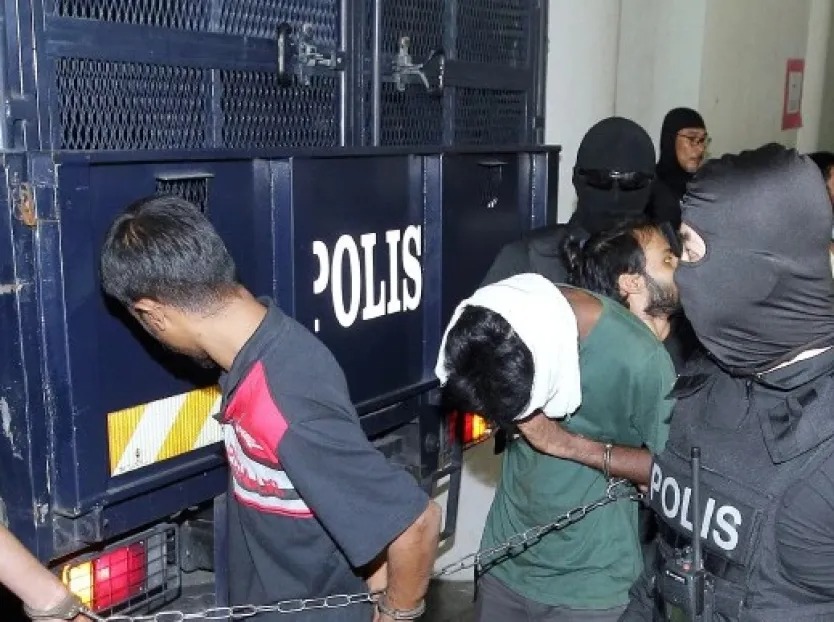
This operation was not an isolated incident. In a report from 2018, the City police were on the hunt for 22 individuals believed to be members of Gang 08, who had been actively involved in organised crimes over the past three years. Following a successful operation named Op Capital KL 2018, where 19 gang members were apprehended, including a father and son, as well as two siblings, the remaining suspects fled the city to evade arrest. The City police chief, Datuk Seri Mazlan Lazim, emphasised that these individuals were involved in a range of criminal activities, such as murder, robbery, extortion, intimidation, violence, and illegal possession of firearms.
Moreover, in a subsequent development in 2022, a total of 28 men faced charges in the sessions court for their affiliation with an organised crime group known as “Gang 08 GST.” The accused individuals, including names such as P Thanasegaran, K Saravanak Kumar, and S Selvamogan, were charged with membership in the group, which operated between January 2019 and June 23, 2019, at the Tin Mine in Kalumpang, Hulu Selangor. The charge, falling under Section 130V(1) of the Penal Code, carries a maximum penalty of 20 years’ imprisonment upon conviction.
Given the gravity of the charges and the nature of their crimes, none of the accused were granted bail and were subsequently remanded at the Sungai Buloh Prison. The charges were brought forth under the purview of the Security Offences (Special Measures) Act 2012, which falls within the jurisdiction of the High Court.
Crimes in the Digital Age
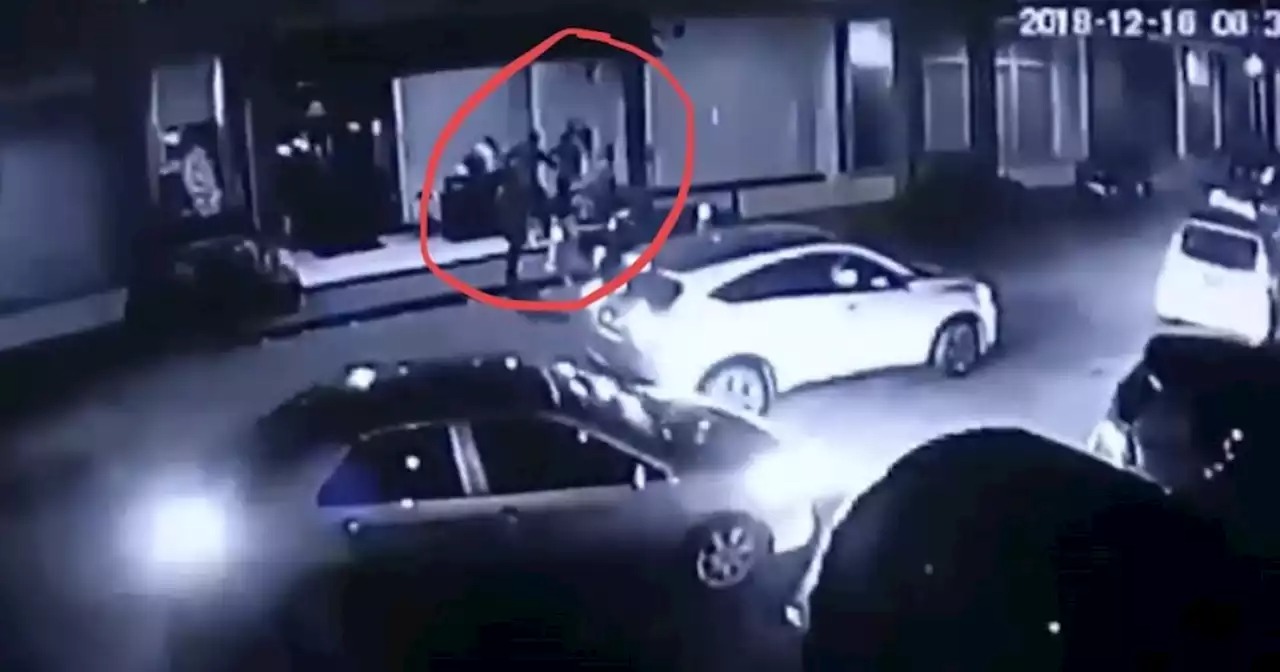
Apart from that, in June 2018, five members of the gang were apprehended following their involvement in a disturbing incident that gained widespread attention due to a viral message and video circulating online. The footage depicted the brutal assault of an individual, identified in media as a “football fan,” who was subjected to a vicious attack and subsequently run over by a motorcycle in Rawang.
Another recent viral instance came in the form of footage recorded and uploaded onto Youtube of a vicious physical fight that broke out in February 2021, between members of Gang 08 and Gang 36, another widespread notorious group operating in Peninsular Malaysia, predominantly consists of Indian members and receives financial support from Chinese businessmen involved in real estate and other industries. The name “Gang 36” carries a significant association with the Chinese Triads, particularly Triad 6, indicating its lineage as an offshoot of the established Chinese triad known as Hung Meng Hooi.
The incident occurred in Cheras, and is believed to have been part of an ongoing drug turf war between the two groups.
The video recordings that surfaced provided a disturbing visual account of a clash between two groups, resulting in severe injuries inflicted upon several members involved. The altercation escalated to the extent that cars, believed to be belonging to the suspects, were also subjected to damage during the incident. In response to the gravity of the situation, ten individuals were apprehended and taken into custody.

Despite this, multiple forms of footage of a similar nature remain on the public domain. Another “famous” example would be a clip taken at a “Gang 36 birthday party”, in which one member seamlessly slices a cake, adorned with what is believed to be the gang’s logo and signature colours, using a machete.
A Ruthless Empire
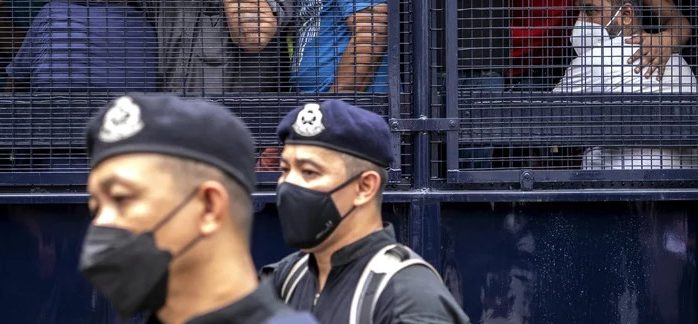
As of today, the list of wanted criminals linked to Gang 08 remains extensive, while police continue to carry detailed lists of suspects, accurate down to their IC numbers, in their possession.
It is known that the activities of Gang 08 were not limited to a specific region. They operated in different parts of Malaysia, with a particular stronghold in the Klang Valley area, including Kuala Lumpur and its surrounding districts. Their influence extended to other states as well, with reports of their involvement in criminal activities in Penang, Johor, and Perak.
The gang’s criminal operations extended beyond traditional organised crime, as they also engaged in cybercrime activities. They were known to be involved in online scams, credit card fraud, and hacking. This demonstrated their ability to adapt to modern criminal techniques and exploit technological advancements for their own gain.
The impact of Gang 08’s activities was far-reaching, instilling fear and disrupting the peace in communities across Malaysia. The brazen acts of violence committed by the gang members sent shockwaves through society, with innocent bystanders often becoming victims of their brutal crimes. The exact number of gang members today is unclear, however, a 2014 report disclosed an estimated total of 4,423.
In modern times, some members also openly advocate for the gang, some going so far as to tattoo the number ’08’ onto their skin. Others express their solitude with the gang in subtler ways, such as in the form magic 8 ball or spiderweb tattoos. Many also employ the 8-ball and spiderweb emojis to their social media bios or the number ‘8’ to their usernames indicate their oneness with the gang.
Local police also released photos of gang members who were arrested due to sporting these tattoos to alert the public and possibly bring about more tip-offs. Here is one example that was published by PDRM in 2019:
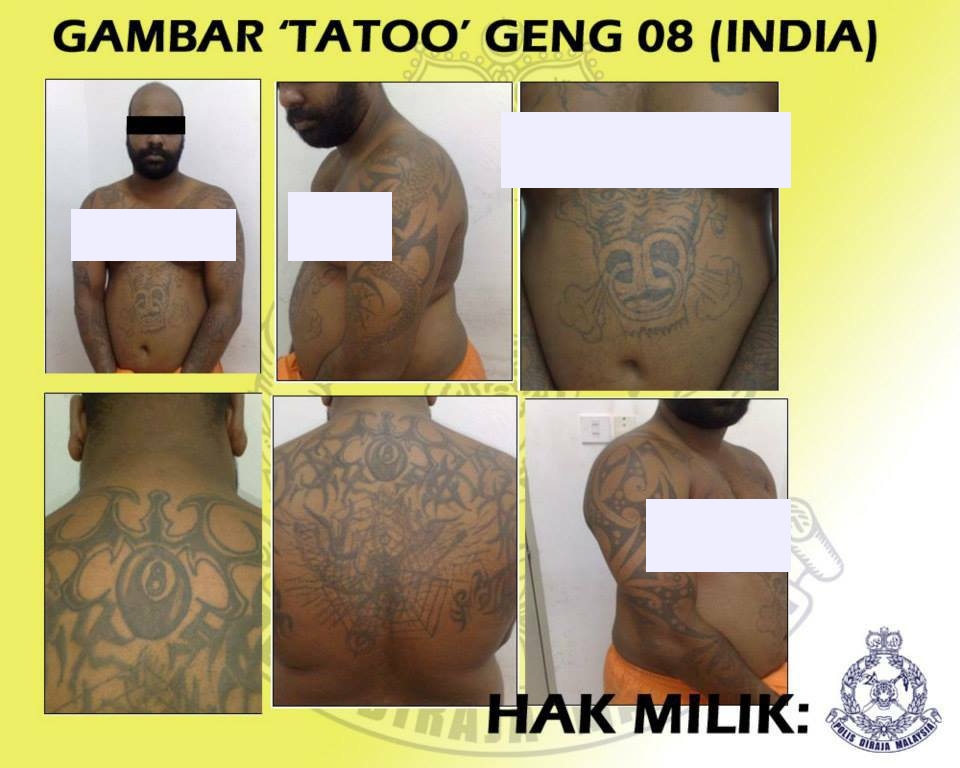
Notably, the gang is also said to have a Tamil motto which roughly translates to “Who is on top? The 08 group”. This saying has been seen spray painted onto public areas, and even written on secondary school desks. Additionally, many members celebrate the unofficial “08 Day” on August 8th every year, often stylised 08/08.
Another unfortunate consequence of the rise of Gang 08 is the alleged generalisation of the Indian community and the subsequent increase in hate crimes and racism targeting innocent individuals within that society, particularly Malaysian Tamils. This disturbing trend highlights the damaging effects of stereotyping and the dangers of associating an entire group with the actions of a few.
Some Malaysian Indians also believe there a growing tendency to associate tattoos on individuals of Indian descent with gang affiliations, specifically Gang 08 or other criminal gangs. This association is not only unfair but also unfounded, as the artwork on their bodies may have no connection whatsoever to any gang. In fact, tattoos have a rich cultural and historical significance in many nations, including India.
It is also believed that not all Malaysians who associate themselves with Gang 08 are fully aware of the true extent of its criminal activities. Some individuals, particularly the youth, may naively join the gang or use its name in pursuit of power or a sense of protection without fully comprehending the heinousness of its actions. However, such involvement can ultimately and inevitably lead them to legal trouble and the endangerment of their lives.
On the other side of the coin, some allegations state that a handful of members were coerced into joining the group for financial gain, while others had done so in moments of desperation- mostly depending on the gang leaders or other members to protect or ‘rescue’ them from certain personal circumstances.

The authorities, recognising the gravity of the situation, have since intensified their efforts to combat Gang 08. Special task forces were formed, consisting of highly trained officers dedicated to tracking down and apprehending the gang members. The police employed various strategies, including intelligence gathering, surveillance, and undercover operations, to dismantle the organisation and bring its members to justice.
Over the years, the police made significant progress in disrupting the operations of Gang 08. Several key members were arrested and prosecuted, weakening the gang’s infrastructure. However, it is important to note that criminal organisations like Gang 08 often have a network of associates and loyal followers who continue their activities even in the absence of their leaders.
It is also said that some members have utilised the gang’s resources and employ other members to perform harmful acts with a personal or vengeful agenda, though this claim has not been verified by the police nor any other reliable sources.
All in all, the fight against Gang 08 and similar criminal groups remains an ongoing battle for law enforcement agencies in Malaysia. The authorities continue to work tirelessly to dismantle these groups, employing a multi-pronged approach that includes proactive policing, community engagement, and collaboration with international agencies to combat transnational organised crime.
As we reflect on the reign of Bentong Kali and Gang 08, let us not forget the innocent lives tragically taken away. Their stories serve as a somber reminder of the devastating impact of organised crime. May their souls find eternal rest, and may their stories inspire us to strive for a safer and more just society.


 Get Audio+
Get Audio+ Hot FM
Hot FM Kool 101
Kool 101 Eight FM
Eight FM Fly FM
Fly FM Molek FM
Molek FM